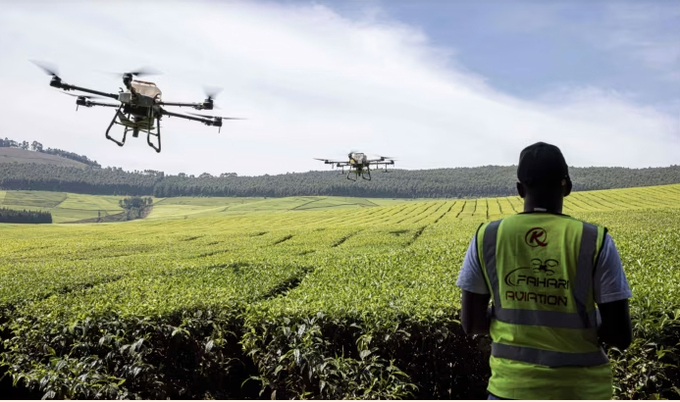December 31, 2025 | 08:45 GMT +7
December 31, 2025 | 08:45 GMT +7
Hotline: 0913.378.918
December 31, 2025 | 08:45 GMT +7
Hotline: 0913.378.918

Unmanned aerial vehicles spread fertiliser at Kipkebe Tea Estate in Kenya in 2022. Since the 1960s, new seed varieties and improved access to fertilisers have helped transform agricultural production across the world. Photo: Patrick Meinhardt/AFP/Getty Images
An hour away from the medina of Marrakech and its throngs of tourists, plains of semi-desert stretch across the horizon. Here, at the Benguerir mine, huge diggers bore into the ochre earth to reach the phosphate rock beneath, a resource that could help shape Africa’s future.
OCP, a state-owned Moroccan company, digs 44mn tonnes of phosphate rock out of Benguerir and three other mines each year for processing into fertiliser. By 2027, that will reach 70mn tonnes. While most of its output is currently shipped outside the continent, it is on Africa that the company is pinning its future.
The company is pouring cash into developing the continent’s agrifood sector, investment that it hopes will result in a big increase in demand for fertiliser. It is a massive gamble given that Africa had to import $43bn of food in 2019, according to World Bank estimates. That figure is set to rise to $110bn by 2025, it predicts.
The continent’s agriculture is generally inefficient; average yields from cereals are half those of India and a fifth of those of the US. Political insecurity, poor infrastructure and conflict scare off investors and the challenges of climate change are particularly acute.
But OCP is not alone in reckoning that Africa can produce enough food to sustain itself and perhaps even supply other parts of the world. The UN forecasts a global population of 10bn people by 2050 will require 60 per cent more calories.
“Africa can be a net food exporter,” Bill Gates tells the Financial Times. “Even in the face of climate change.” The Microsoft co-founder, whose charitable foundation is investing across the continent, says better seeds and better livestock genetics could have a big impact. “That plus fertiliser — that’s the green revolution.”
Since the 1960s, new seed varieties and improved access to fertilisers have helped transform agricultural production across many parts of the world. In Asia, for example, rice yields doubled between 1965 and 1995.
Africa was left almost untouched by this agricultural revolution, held back in part by too few people to farm its abundant land. Today, the continent has 60 per cent of the world’s available arable land and a growing young population to work it.
For OCP, a company whose strategy often overlaps with Morocco’s diplomatic agenda in Africa, the rewards could be huge. The continent uses 24kg of fertiliser per hectare of land on average, according to the FAO, a fifth of the global average. “To put it simply, yields are maybe a quarter of their potential today, across the board in Africa,” says Ilias El Fali, OCP’s managing director for corporate strategy, performance management and operations co-ordination. “If we manage to bring them closer to their potential, we can create a lot of value.”
To raise those yields, he estimates that Africa will need to consume 10 times as much fertiliser. If it can do so, El Fali and OCP believe Africa can “really become the breadbasket of the world, not only to ensure its own food security, but also to contribute to relieving the global food security challenge.”
It is an enormous task, says David Laborde, director of agrifood economics at the UN’s Food and Agriculture Organization (FAO). “For the future of the world, we need to see a transformation in Africa like we have seen in Latin America,” he adds. He predicts it will be a slow process. “Investing in Africa today is both more risky politically and in terms of the climate.”
(FT)

(VAN) From emissions cuts to energy sovereignty, France’s president reflects on COP21's legacy.

(VAN) A Yale University poll from earlier this month says most Americans see climate change as playing a role in hurting prices and the cost of living.

(VAN) According to the National Food and Strategic Reserves Administration, this year's autumn grain entered the market earlier and boasts good quality.

(VAN) The Trade Policy and Strategy Office (TPSO) under the Commerce Ministry reported that exports in November 2025 were worth US$27.445 billion, expanding for a 17th consecutive month at 7.1%.

(VAN) Ukraine’s leading poultry processor and exporter, MHP, plans to kick off a trial production of insect meal in the first quarter of 2026, as revealed by Serhiy Melnychuk, scientific advisor to the chairman of MHP.

(VAN) Researchers have warned of the unexpected consequences of extremely hot, humid conditions during pregnancy.

(VAN) A group of Iranian scientists from the National Institute of Genetic Engineering and Biotechnology claimed that they have developed a technology that allows effective processing of poultry feathers into meal using a Bacillus strain.